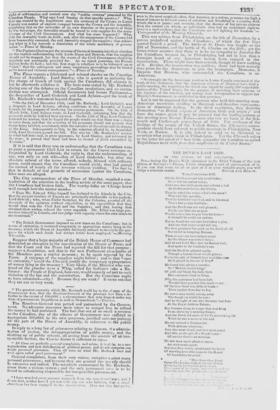" The British Government imposed no new taxes on the
Canadians ; but in a case of extremity, it ventured temporarily to appropriate money lying in the treasury, which the House of Assembly factiously refused to devote to the pur. posee for which such funds had always before been employed. "—Morning Chronicle.
Suppose that a large majority of the British House of Commons had demanded an alteration in the constitution of the House of Peers, and that the Court and the Peers had rejected the bill for that purpose : suppose a dissolution, and that in the new Parliament nine-tenths of the Members pass a similar measure ; to be again rejected by the Peers. A stoppage of the supplies might follow ; and in that "case of extremity," would the Chronicle justify the temporary appropriation of money lying in the treasury ? Very likely, if the Minister who ven- tured on the plunder were a Whig, called for fashion's sake a Re- former : the People of England, however, would scarcely sul mit to such violation of the law and the constitution. But the Canadians ought to have submitted—why ? Because they are weak ? It ttuns out that they are not so very weak.


























 Previous page
Previous page